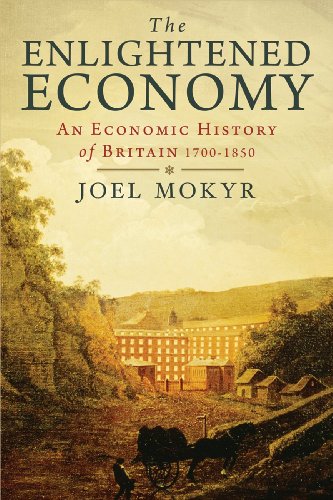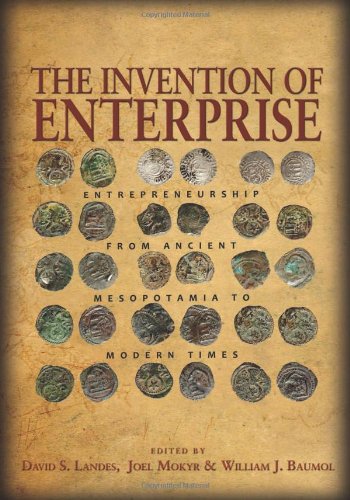The Enlightened Economy: An Economic History of Britain 1700-1850
Joel Mokyr
(Yale University Press, 2010, 552 pages),
and
The Invention of Enterprise: Entrepreneurship from Ancient Mesopotamia to Modern Times
David S. Landes, Joel Mokyr & William J. Baumol
(Princeton University Press, 2010, 608 pages)
 How did economic growth occur? Why during the 200,000 years in which we can recognise modern man, did almost all humans live ''nasty brutal and short'' lives that barely hovered above the subsistence level? And how then did we break out of this trap to reach our current living standards?
How did economic growth occur? Why during the 200,000 years in which we can recognise modern man, did almost all humans live ''nasty brutal and short'' lives that barely hovered above the subsistence level? And how then did we break out of this trap to reach our current living standards?
It is true that development took place before the onset of the modern era. Punctuated by downward trends in real living standards, we did see the development of farming, sea going vessels, and clothing. Above all, notwithstanding the post-Roman loss of technologies like ''Greek fire'', we saw many new innovations.
However, these earlier gains are insignificant compared to what has taken place in the past 500 years. And what was once confined to islands of economic development in Holland, northern Italy, and England, has come to embrace virtually the entire world.
This geographical spread was first by the British diaspora to its North American colonies and by European states. It made its earliest tentative spread outside western cultures in Japan 120 years ago but it is only in the past 20 years that it has enveloped virtually all of Asia. And even the places left largely apart from development itself share many of the outcomes of development: the mobile phones, cars, medicines, building materials and clothes.
The economic take-off of the world is generally considered to have taken place with the primarily English based industrial revolution covering the years from around the early 18th century. Almost from the start it was the subject of considerable curiosity by economists and economic historians. The latest in the long line of historians seeking to discover the elixir is Joel Mokyr (The Enlightened Economy and, with David Landes and William Baumol, The Invention of Enterprise.
Both books credit entrepreneurs for the great economic take-off -- a hospitable environment that fostered entrepreneurship is the reason inventions did not languish, adaptations to inventions were constantly made, and why there was a headlong rush of new inventions from the 18th century. The team of Matthew Boulton and James Watt is the archetype. Both were inventors, but Watt's invention, the steam engine, eventually saturated demand for its water pumping uses. It needed to be adapted to new uses. With Boulton, Watts set about inventing the ''sun and planet gear'' -- a series of gears to convert the energy into a rotary motion -- allowing the steam engine to lead to locomotion.
 The slow break with the past
The slow break with the past
Like other such changes, the modern economic take-off was not an abrupt transformation -- commercial advances, transport improvements and manufacturing innovations had taken place prior to then. And though the Dutch and northern Italians had experienced a major income increase in the centuries before, it is clear that an upward inflection of the economic growth and income curves took place after 1700 -- dominated by England and her American colonies. That upward inflection has continued -- with per capita growth rates of 7-10 per cent seen in Japan, China, and India.
Although innovations can be traced back to antiquity, it was the primarily British industrial revolution that saw the multitudes of inventions in cloth making, iron and steel, engines, agricultural and mining equipment and the factory system. These developments and the hundreds of entrepreneurs who developed and progressed them transformed Britain into the world's dominant economic (and military) power by the early part of the 19th Century.
For whatever reason, the hundreds of entrepreneurs in Britain both pioneered and adapted inventions on a scale never previously seen. One reason may have been the Patent Laws of Queen Anne -- annual patents taken out rose from 9.5 in 1740s to 51 in 1780s. Many claim that British entrepreneurs merely applied inventions from the Continent, but this has shades of the argument later leveled at America during the 20th century.
So what makes growth?
The growth process clearly requires some fundamental conditions and the presence or absence of these is a key reason why it occurred in some places but not others. However, there remain many caveats and inconsistencies. Why did this occur initially in Britain, and not elsewhere? And why did some nations subsequently grasp the opportunities for wealth generation, and others did not?
Economic growth, in per capita terms, is the result of several factors: capital accumulation, the application of innovation and know-how, skill formation, and trade to enable savings by the redirection of high cost production to low cost supplies.
Expropriation or heavy taxation is a sure-fire deterrent to investment in anything other than riskless assets. The Glorious Revolution of 1688 placed a higher priority on that in Britain.
However, property rights had been fairly secure throughout Western Europe for many centuries. Indeed property rights have been a feature of Western Civilisation generally. During the siege of Troy, the Greek forces felt they had to approach the owner of the local forest to buy the wood needed to build the Wooden Horse.
Freedom from expropriation certainly marked out the Christian cultures from Eastern potentates, where, for example, under Islam the religio-political ruler owned everything of the conquered.
And it is the de facto abandonment of personal expropriation that has brought the Chinese miracle.
Innovations, and openness to the adoption of those innovations, are clearly important, as long as there are the requisite skills to do so.
As to the specific conditions that created the industrial revolution in Britain, those that have often been identified include the relative isolation of England and homogenous culture which allowed greater security and savings in defence spending; the Parliamentary superiority at least post 1650 that legitimised taxation; open markets and low regulation; and labour mobility.
Pinpointing of conditions that were unique to the British economic take-off experience however presents some incongruences in determining the causes of that growth, and thus the means of replicating them. As previously mentioned property rights, at least for merchant classes were relatively secure throughout most of Europe from medieval times.
Conquerors, once the Islamic threat disappeared, would always respect individual ownership.
Nor was the isolation of Britain cause for low government spending. Taxation in France and Prussia was lower -- especially after 1789. And though Mokyr argues that the regressive nature of British taxation might have retarded its efficiency, most modern writers would regard such taxation (which is levied at a flat rate) to be more efficient in terms of avoiding distortions.
Access to finance, especially from non-family sources is often seen to be a vital means of unleashing entrepreneurship. In this respect, however Britain put in place onerous conditions on the raising of capital. After the 1720 South Sea Bubble a new company float needed its own separate act of Parliament.
It is in the area of trade that the proscriptions for strong growth hit against the greatest conflicts. Trade, in allowing a better division of labour and specialisation, is a major means of obtaining more for less effort.
It is also at the heart of what the economist Joseph Schumpeter termed ''creative destruction''. Schumpeter argued that this, in allowing a cheaper approach to displace existing supplies, was far more important than the normal ongoing incremental improvements to production. Seeking trade liberalisation has been one of the cardinal goals of international relations over the past 60 years.
Is there a way forward?
The two Mokyr books do not purport to offer a blueprint for growth. They elevate the role of the entrepreneur as the engine of growth when operating in an environment of liberal policies together with respected and readily defended property rights.
Yet we see then and now illiberal policies co-existing with economic success. Although Britain championed free trade, that was only after having achieved economic success. Indeed, the Corn Laws were first passed in 1670 and not repealed till mid-19th century; the Calico Acts (repealed 1774) attempted to prevent cheap Indian cloth out, though cotton is likely to have prevailed anyway.
Though controls by East India and Hudson Bay monopolies had largely become defunct by 1720, the Navigation Acts were passed to hit the Dutch and only abolished in 1822.
Moreover the average British tariff exceeded that of France in most of the 19th century. On average, tariffs were 60 per cent in 1820, falling to 20 per cent in 1850. In this respect, much is also made of a progressive deregulation which repealed over four-fifths of 18,110 Acts passed since the thirteenth century in the 200 years to the 1870s. But again, this was mainly after the economic take-off was well under way.
The rather less than rigorous welcoming of trade freedom by Britain also characterised later economic take-offs in Germany and the US and more recently in Japan, Korea and China. Indeed, Hong Kong may be the only example of economic success using a classical economic approach of low barriers to trade and other competition, small government, low taxation and the rule of law.
Finally a question emerges about the conditions for take-off with regard to India. Demonstrably not lacking in local entrepreneurship spirit, having been ruled under British laws, by administrators of a high level of personal integrity and facing low levels of regulatory intrusion and low taxes, India utterly failed as an economic entity until the past decade or so. Though faulty inward-looking and protectionist polices characterised the nation from 1948, its failure under the Raj is especially perplexing.
Some suggest the caste system and institutional deficiencies that meant inadequate access to finance as significant matters but neither of these is persuasive.
All this demonstrates that the perfect conditions specified by economists need not be present. We can however see from comparing the extremes of confiscatory politics in Zimbabwe and much of Africa with the successful economies that governmental structures and their costs arc crucial to the process.
No comments:
Post a Comment